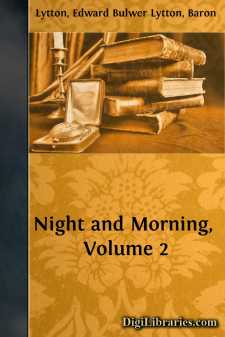Categories
- Antiques & Collectibles 13
- Architecture 36
- Art 48
- Bibles 22
- Biography & Autobiography 813
- Body, Mind & Spirit 142
- Business & Economics 28
- Children's Books 15
- Children's Fiction 12
- Computers 4
- Cooking 94
- Crafts & Hobbies 4
- Drama 346
- Education 46
- Family & Relationships 57
- Fiction 11828
- Games 19
- Gardening 17
- Health & Fitness 34
- History 1377
- House & Home 1
- Humor 147
- Juvenile Fiction 1873
- Juvenile Nonfiction 202
- Language Arts & Disciplines 88
- Law 16
- Literary Collections 686
- Literary Criticism 179
- Mathematics 13
- Medical 41
- Music 40
- Nature 179
- Non-Classifiable 1768
- Performing Arts 7
- Periodicals 1453
- Philosophy 64
- Photography 2
- Poetry 896
- Political Science 203
- Psychology 42
- Reference 154
- Religion 513
- Science 126
- Self-Help 84
- Social Science 81
- Sports & Recreation 34
- Study Aids 3
- Technology & Engineering 59
- Transportation 23
- Travel 463
- True Crime 29
Ernest Maltravers - Complete
Description:
Excerpt
CHAPTER I.
"My meaning in't, I protest, was very honest in the behalf of the
maid * * * * yet, who would have suspected an ambush where I was
taken?"
All's Well that Ends Well, Act iv. Sc. 3.
SOME four miles distant from one of our northern manufacturing towns, in the year 18—, was a wide and desolate common; a more dreary spot it is impossible to conceive—the herbage grew up in sickly patches from the midst of a black and stony soil. Not a tree was to be seen in the whole of the comfortless expanse. Nature herself had seemed to desert the solitude, as if scared by the ceaseless din of the neighbouring forges; and even Art, which presses all things into service, had disdained to cull use or beauty from these unpromising demesnes. There was something weird and primeval in the aspect of the place; especially when in the long nights of winter you beheld the distant fires and lights which give to the vicinity of certain manufactories so preternatural an appearance, streaming red and wild over the waste. So abandoned by man appeared the spot, that you found it difficult to imagine that it was only from human fires that its bleak and barren desolation was illumined. For miles along the moor you detected no vestige of any habitation; but as you approached the verge nearest to the town, you could just perceive at a little distance from the main road, by which the common was intersected, a small, solitary, and miserable hovel.
Within this lonely abode, at the time in which my story opens, were seated two persons. The one was a man of about fifty years of age, and in a squalid and wretched garb, which was yet relieved by an affectation of ill-assorted finery. A silk handkerchief, which boasted the ornament of a large brooch of false stones, was twisted jauntily round a muscular but meagre throat; his tattered breeches were also decorated by buckles, one of pinchbeck, and one of steel. His frame was lean, but broad and sinewy, indicative of considerable strength. His countenance was prematurely marked by deep furrows, and his grizzled hair waved over a low, rugged, and forbidding brow, on which there hung an everlasting frown that no smile from the lips (and the man smiled often) could chase away. It was a face that spoke of long-continued and hardened vice—it was one in which the Past had written indelible characters. The brand of the hangman could not have stamped it more plainly, nor have more unequivocally warned the suspicion of honest or timid men.
He was employed in counting some few and paltry coins, which, though an easy matter to ascertain their value, he told and retold, as if the act could increase the amount. "There must be some mistake here, Alice," he said in a low and muttered tone: "we can't be so low—you know I had two pounds in the drawer but Monday, and now—Alice, you must have stolen some of the money—curse you."
The person thus addressed sat at the opposite side of the smouldering and sullen fire; she now looked quietly up, and her face singularly contrasted that of the man....












